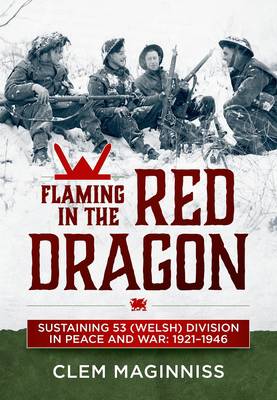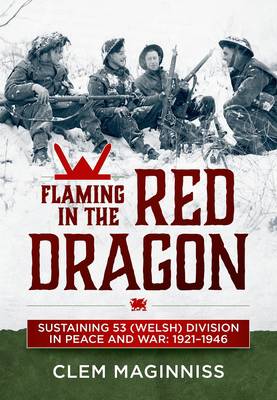
Bedankt voor het vertrouwen het afgelopen jaar! Om jou te bedanken bieden we GRATIS verzending (in België) aan op alles gedurende de hele maand januari.
- Afhalen na 1 uur in een winkel met voorraad
- In januari gratis thuislevering in België
- Ruim aanbod met 7 miljoen producten
Bedankt voor het vertrouwen het afgelopen jaar! Om jou te bedanken bieden we GRATIS verzending (in België) aan op alles gedurende de hele maand januari.
- Afhalen na 1 uur in een winkel met voorraad
- In januari gratis thuislevering in België
- Ruim aanbod met 7 miljoen producten
Zoeken
€ 97,45
+ 194 punten
Omschrijving
Flaming in the Red Dragon is a completely new academic perspective on British Army divisional history, which analyses the sustainment of 53 (Welsh) Infantry Division, in peace and war, throughout its cycle of inter-war development, mobilization, reorganization and training in UK, to combat operations in North-West Europe by examining and assessing the strengths, limitations, requirements, structures, preparation and operations of its People and Logistics, AQ in the terminology of the day. Flaming in the Red Dragon covers a fascinating spectrum of activity: the interactions of and demands upon, the 53 WID AQ Staff, divisional movement in the UK, the lessons of Exercise SPARTAN in 1943, preparing for Operation OVERLORD in 1944, Q artillery planning, the steady of toll of losses from accidents in training and combat, soldier and officer discipline, the influence of Luftwaffe air action upon AQ operations, handling of Prisoners of War, health & hygiene and care of the dead. Flaming in the Red Dragon assesses the many forgotten daily aspects of divisional life, including accommodation, battle-fatigue, entertainment, laundry, leave, mail, pay, spiritual support and welfare. Operationally it explains how war-fighting was supported through the provision of transport, ammunition, fuel, rations, water, spares, the recovery and replacement of equipment, the criticality of AQ planning and traffic control, and the integration of the complex Q support for armour and specialist vehicles. The story does not end with VE Day because AQ was deeply involved in post-war stabilization and occupation tasks in Germany, which posed not only significant but often demanding AQ challenges.
Specificaties
Betrokkenen
- Auteur(s):
- Uitgeverij:
Inhoud
- Aantal bladzijden:
- 416
- Taal:
- Engels
- Reeks:
Eigenschappen
- Productcode (EAN):
- 9781804519745
- Verschijningsdatum:
- 15/06/2026
- Uitvoering:
- Paperback
- Formaat:
- Trade paperback (VS)
- Afmetingen:
- 171 mm x 248 mm

Alleen bij Standaard Boekhandel
+ 194 punten op je klantenkaart van Standaard Boekhandel
Beoordelingen
We publiceren alleen reviews die voldoen aan de voorwaarden voor reviews. Bekijk onze voorwaarden voor reviews.









